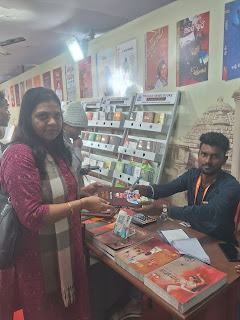(Downloaded from internet)
I was going to my
village. My village was more than one hundred and fifty kms from the place
where I was working, and I had to change three buses to reach my village. I
started early, reached Cuttack at around 9, in the morning. I entered into a
restaurant near the bus stop to have my breakfast. I was eating chhole bhature.
I had not yet finished, the restaurant boy served me chhenapod, a sweet
dish.
I had not ordered Chhenapod,
but I would have. I had a sweet tooth, chhenapod looked fresh and alluring
in the morning. I was, perhaps, the first customer they were serving after
cutting into pieces the sweet pancake, cooked last night. I thought the boys
working in this restaurant, perhaps, could guess the taste of the customers,
and to increase the sales of the restaurateur, might be serving before the
customer asked for it.
I started chhenapod
after chhole bhature.
Before I finished chhenapod,
the boy placed sweet curd on my table. I had also not ordered sweet curd,
though I liked it also. I asked the boy, “I am not ordering, how do you serve
yourself, one dish after another?”
The boy indicated a man
sitting two or three tables away from me and said, “The gentleman sitting there
is ordering for you.” I looked at the man. He bowed his head to wish me. The
man had come to the restaurant before I, and was having his breakfast, enjoying
the sweet curd. He finished his breakfast and came to me. He sat on the front
chair and asked, “Sir, don’t you recognize me?”
I could not. I was trying
to locate where I could have met him. Without giving me much time to think, he
said, “I was your student.”
I was teaching in a
college for two and half years before I entered into an administrative job. I
had already left the college for more than fifteen years. The appearance of the
boys changed a lot after they entered into a profession and their worldly life.
I was trying to remember, but could not. I asked, “What are you doing?”
“Sir, what you once told
us we would do, I am doing that. I am a bus conductor.”
I remembered. If the
students were doing mischief; irritated, I would scold them by saying, you
would become nothing, but bus conductor or amin (land surveyor). I used
to say, “When we were students, our parents did not have enough money to spare
for our education. With much difficulty we studied with meagre amount our
parents could provide. The colleges were in the city, far away from the
villages. The number of colleges were also very few. All the students who
passed Matriculation could not get seats in the college. Many good students could not study since the
cost of staying in the city and studying in the college were beyond
affordability of their parents. Now the colleges have come to the villages. You
take your food in your home, walk or ride a cycle from your village to the
college. You should take advantage. But your minds are elsewhere, not in
studies. You are missing the opportunity. You are destined to be, at best,
conductors or amins.”
I said to my former
student cum bus conductor, “That was not my purpose. I scolded you since you
did not read, but involved in mischief. I wish whatever you may do, you live in
peace. One earns to keep living, but one should earn in honest means. Be good
human beings, that’s important. You should not have any inferiority complex for
the job you are doing.”
I had started
sermonizing; a habit I had with me, perhaps, since my teaching days. Old habits
had not died.
“No, sir, I don’t mean
anything. I was joking. We did not listen to you then, now we realize. Where
are you going to?” he asked.
“Going to my village,
shall go up to Chandikhole now. From there I shall change a bus.”
He said, “Then let’s go by my bus. Our bus is
going to Balasore.”
My student cum conductor
seated me in the conductor’s seat, his seat. He collected fare and issued
tickets. He did not accept fare from me. Instead, he presented me with a pack
of cigarettes and a match box. He knew I was smoking when I was in the college.
Of course, I had not given up the habit.
I had heard this story
from a friend. The student of a well-known professor joined Indian
Administrative Service (IAS). He was posted as secretary, education department.
The professor then was the Director of Public Institutions (DPI). Once, in a
meeting, the director who was the former teacher of the secretary, addressed
him by his first name. Annoyed, the secretary reprimanded, “You forget, you are
speaking to your secretary!” The director immediately corrected himself and
said, “Sir…”
The director and the
secretary were both well known; two very important persons in the state.
This maybe a rumour. Some
persons in the society, out of jealousy, concoct stories about achievers and
established personalities; and people, for the same reason, love to believe
them. Still, many have this impression; people in administration, particularly
in the IAS, are also callous towards love and affection of their subordinates
and people below them. They do not understand true feelings.
I believe, had my student
been an IAS officer instead of a bus conductor, he would not have behaved as
the secretary behaved with his former professor.
I was proud of being a
teacher in the college for a few years.
*****






























